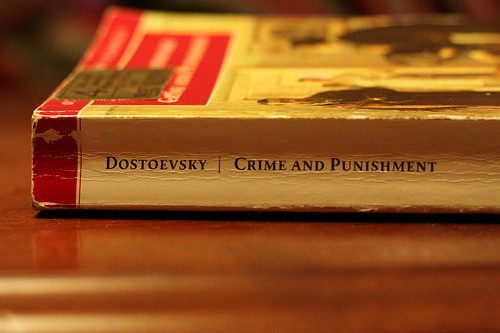 |
The
book Crime and Punishment, written by
Russian novelist Fyodor Dostoevsky is based on a random murder of an old moneylender by a former student of law. But the book is not a crime
thriller, for the murder takes place in the first part in a seven-part long
storyline. Regarded as Dostoevsky’s magnum opus and one of the best literary
works of Russian literature, Crime and Punishment offers a view into
Raskolnikov’s mind (the murderer and the protagonist). The novel can be best
characterized as a psychological thriller. In his book, Dostoevsky grapples with
questions like- what pushes a man into committing a hideous crime as murder in
cold blood? Unlike the ideal state of the human mind and soul, as is often depicted, Crime and Punishment shows the turbulent state
of the mind of Raskolnikov and the contradictions within his soul- completely naked. In the plot,
Raskolnikov, a bright young student, has to drop out of university because of the lack of money to support his studies. Sinking into an abyss of hunger and
fever, he decides to murder and rob the moneylender to whom he pawns his
valuable belongings. Having convinced himself that he has a ‘right to kill such
a louse and old crone’, Raskolnikov puts the axe into the feeble body of his victim, without remorse or regret.
Staged
like a play, the novel offers a holistic view of the city of St. Petersburg but
underlying every scene are the thoughts of the murderer and his torn apart
soul. Dostoevsky paints a very gloomy picture of the 19th century St.
Petersburg, embellished with its stifling streets and abject poverty. In Crime
and Punishment, the fictional suffering becomes almost palpable for the reader. Page
by page, scene by scene the book reveals the character of Raskolnikov- a
rational man, an egoist, who starts to think of himself as the benefactor of
mankind. The book allows the reader to peek into the consciousness of the
protagonist which starts to engulf him like fever even before he commits the
heinous act. But the real art of Dostoevsky lies in combining the opposites in
a perfectly balanced manner. Opposites like the oppressor and the victim
combined in a single fictional character, harmoniously. The only drawback of
Crime and Punishment that can be repulsive for the reader is the length of the novel
(a massive account of 720 pages). But the effort in treading through the book
is worth it. As even if the book is one hundred and fifty years old, it leaps
out of its time and confronts us as if it has not yet said its final word. And
so the magic of Crime and Punishment persists!
 |
**picture credit: Robin R. Bates
This article highlights some very important challenges students face during the dissertation process, especially in psychology where research design and data analysis can be complex. The explanation of managing stress and maintaining academic accuracy is particularly useful. Many students benefit from seeking help with psychology dissertation to better understand methodologies, improve structure, and stay on track with deadlines. Overall, this post offers valuable insights for anyone aiming to complete their dissertation with confidence and clarity.
ReplyDelete